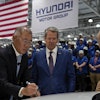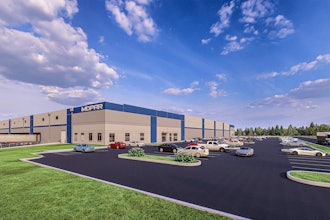SANDY LAKE, Pa. (AP) -- Upset that General Motors was planning to "wind down" the dealership where they had loyally bought their Chevys for years, schoolteacher Marie Kohr and her husband, Kevin, went to GM with a message: "You are killing America."
The Kohrs included with their letter a copy of a high school yearbook ad that Walker Chevrolet bought in tiny Sandy Lake in 1937 -- a purchase the dealership has made every year since.
"Herein lies the problem," the Kohrs wrote. "Our local dealer has been unfairly deemed worthy of being closed. ... Apparently, loyalty is not important to you."
General Motors Corp. has announced plans to pull 90 franchises in Pennsylvania and Chrysler Group LLC more than 50 -- the most in any state for both companies -- and along with them, a slice of Americana.
New-car dealers in Pennsylvania record fewer sales per dealer than many other states. To blame are declining sales and the large number of small-volume shops in a vast state composed largely of small towns isolated from one another by mountains.
The failing companies are often targeting lower-volume, older franchises like Bob Kaltenbaugh's brick and cinderblock Walker showroom on Main Street in Sandy Lake, a town of 743 people about 60 miles north of Pittsburgh.
Kaltenbaugh's grandfather opened Walker Chevrolet in 1933, and sales have declined slowly but steadily since Kaltenbaugh sold 200 new and used vehicles the year he bought out his uncle: 1984.
Still, his customers consistently "buy American," mostly Impalas and pickups. Kaltenbaugh, who still plans to sell used vehicles after GM pulls out, figures the company should be happy that he can count on selling 60 new vehicles this year, plus 75 used.
Kaltenbaugh says his customers will have to drive 15 to 20 miles to another GM dealer, and he is puzzled by the company's decision. So are some experts who say closing dealers won't automatically boost sales at remaining outlets.
Paul Taylor, the chief economist of the National Automobile Dealer Association, said GM and Chrysler wrongly assume most customers won't switch brands if they're forced to drive to another town.
"I'm dating a beautiful girl, I'm head over heels in love with her. But let's move her to the next city and make me pass by three other beautiful girls who may want to have a relationship with me," Taylor said. "They (GM and Chrysler) assume the relationship with the first girl will be better."
GM is blaming dealers for the company's problems, Kaltenbaugh said.
"Well, I'm not bankrupt," he said. "They forgot that little detail. I guess I have a hard time figuring out how I hurt them."
The car manufacturers want fewer, larger, more modern dealerships so that each sells and services more cars efficiently.
Foreign dealers in the U.S. typically sell 800 to 1,200 new vehicles a year, compared with 300 to 400 for domestic dealers, said Paul Melville, an attorney with Chicago-based Grant Thornton, a corporate restructuring firm.
U.S. manufacturers have wanted to reduce the number of dealer franchises for decades, Melville said, but were frightened of the cost, notably the estimated $1 billion GM spent eliminating Oldsmobile dealerships this decade.
"Would GM prefer not to be in bankruptcy? I'm sure they would," Melville said. "But they can restructure their business at all levels in bankruptcy in a way they would not be able to do otherwise."
GM still has nearly 6,000 U.S. dealers but hopes to get down to 3,600 by eliminating 1,300 franchises and jettisoning 1,100 by shedding its Saturn, Hummer, Pontiac and Saab lines. Chrysler is pulling about a fourth of its 3,200 U.S. franchises.
Carl Kuntz owns a GM dealership, Kuntz Chevrolet-Pontiac-Buick, in Punxsutawney -- home to the nation's Groundhog Day celebration -- and Kuntz Motor Co., a Chrysler dealership, in nearby Mahaffey. Both sell at least a couple hundred new cars a year.
Smaller dealers must simply be more aggressive, Kuntz said, and he has updated his sales slogan to reflect GM's and Chrysler's decision to retain the franchises: "Nobody walks away from a Kuntz deal -- not even Detroit."
Donald Franks isn't sweating the loss of his Pontiac and Cadillac franchise at J.L. Freed and Sons in Lansdale, near Philadelphia. That because Franks also sells Hondas, about 1,200 a year, compared with just 200 GM cars.
U.S. dealers probably can't beat the foreigners, Franks said, but can join them by selling through larger, modern dealerships.
"They need to have stronger retail points that are more competitive," Franks said. "If I can maintain my building and it's a modern building then I can compete. In the end, that's really the only advantage" to cutting franchises.
That's small consolation to Marie Kohr, whose letter to GM lamented the loss of Sandy Lake's Chevy franchise.
"Finally, as you stand at the one traffic light in our town and look south, you will see the Walker Chevrolet dealership to your immediate left, a drug store and a bank to your right," she wrote.
"Look east and you will see a gas station and one block down an auto parts store. To the west and you will see a restaurant and a volunteer fire department.
"Do you get the picture? Walker's is a major artery to the survival of our town."


















